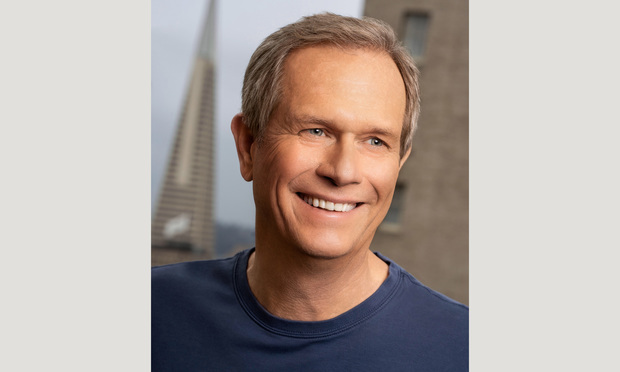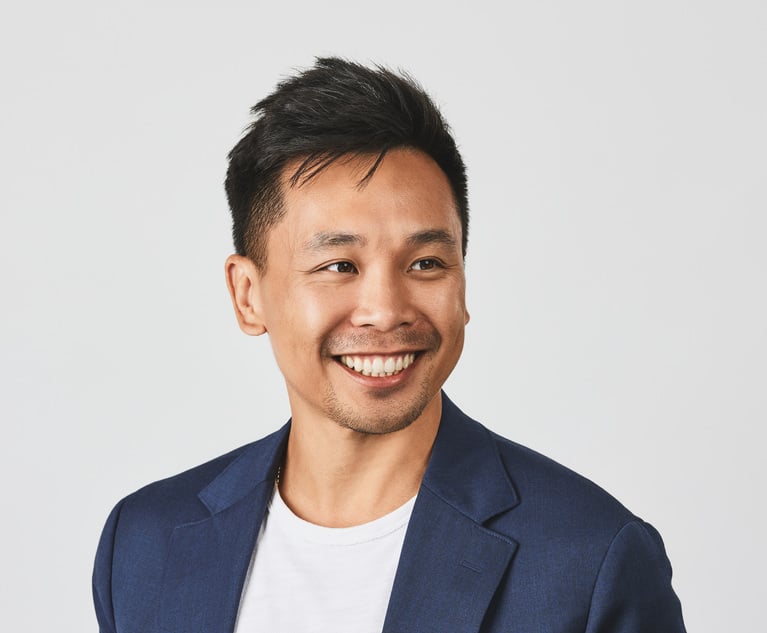Airbnb Chief Ethics Officer Robert Chesnut On Acting With Integrity at Work and in Community During COVID-19
"A crisis like this sort of pressure tests your character as a company," Chestnut said. "How you handle it can really have a substantial impact that will linger on long after this is over."
April 21, 2020 at 01:45 PM
7 minute read
The original version of this story was published on Corporate Counsel
 Rob Chesnut, chief ethics officer at Airbnb.
Rob Chesnut, chief ethics officer at Airbnb.
As the chief ethics officer at San Francisco-based Airbnb Inc., Robert Chesnut oversees a team of 30 ethics advisers who are spread out within the company. His theory is that if ethics is controlled by one person or one department, employees are less likely to bring up ethical issues or questions.
"If ethics is something that is owned by legal or human resources, people get intimidated. If you have someone who is on your team who is in charge of ethics you're a lot more likely to have that conversation," Chesnut said.
In a time where the new coronavirus is on everyone's mind, employees and their employers must think about ethics and acting with integrity. He said employees need to think about conflicts of interest they may have if they want to freelance or begin serving on boards of directors.
He also said it is a time where companies and executives should be finding ways to help their communities. Chesnut, for example, spearheaded an initiative in the Bay Area that allows for companies to donate their snacks to a family homeless shelter. Since he shared the initiative on LinkedIn, others have joined and he's received emails from people across the country who are doing something similar with their local homeless shelters.
This conversation has been edited for length and clarity.
The Recorder: During the pandemic what are some of the ethical issues you find that employees are concerned about?
Robert Chesnut: There are certain things that raise ethical or reporting concerns that aren't applicable anymore. There may be issues around alcohol or sexual harassment that you do not see in this environment.
However, you may see someone post something in Slack, or they'll say something that may create an issue. You still have people who want to be advisers or board members that want to discuss conflict of interest issues. There are people who want to do outside consulting work that could raise conflict issues.
What are some ethical issues companies should be aware of as they navigate through the COVID-19 pandemic?
The No. 1 ethical issue is taking care of your employees. This will vary on how the business is impacted.
But what if you're a grocery store? The world is not safe enough for most of us to go out. But your workers are expected to go out and interact with the public and handle a volume of business that is a substantial increase. A primary consideration has to be, "Are my people safe?"
On the other side of it, you have folks who are trying to work from home. You've got to be aware of how your people are going to feel in this type of a new world. Some of them might have two or three kids who are doing remote school. They may be feeling isolated.
A crisis like this sort of pressure tests your character as a company. How you handle it can really have a substantial impact that will linger on long after this is over.
You may need to lay people off just to survive. It shouldn't be your first step. From an ethical perspective, you've got to be looking at other things.
I think leaders have to sacrifice first. In a time like this, you can't be laying people off and still be collecting your full salary. You can do it, but you're not only going to lose the respect of people you lay off, but you'll also lose the respect of your customers.
You have to think creatively about how you can pivot. How you change the way that you operate as a business. The obvious examples are restaurants. I've seen stories of restaurants selling prepared meals in grocery stores, which is a good way to shift.
Is seeing companies shifting to adapt their businesses and help others what inspired you to begin making the "Integri-Yeti" videos on LinkedIn?
Yes. I think that a crisis can bring out a lot of good in people. In my book, one of the things I talk about is that you get the behavior you reward, but nobody ever rewards integrity. How many companies do anything at all to recognize integrity? Not very many.
Yeti can do these nice water bottle coatings that you can put your logo on. I put the Airbnb logo on a water bottle. We market the ethics program and Airbnb; it has branding that is consistent with the company's branding. We branded our internal ethics program and called it "Integrity Belongs Here."
When we have different meetings around the company or someone sends in a good question to the ethics email address, we recognize them and give them one of these water bottles. It doesn't sound like a lot, but when I give these things out in a group of 100 people will start clapping because you are recognizing somebody who has the courage to speak up. You want to make that something you reward.
A small act of recognition for an act of integrity is how I think you encourage people to do more.
How did you become involved in donating office snacks to local homeless shelters?
There is a nonprofit group of homeless family shelters in the Bay Area called LifeMoves. It is a great organization and they have had an issue because they get food from restaurants but now the restaurants are closed.
They have been reaching out to the community asking for help. They were talking to me about how they needed snacks. We came up with the idea that you have all of these offices closed around the Bay Area and a lot of these companies have snacks for their employees, but the snacks are going stale.
I posted about this and the reaction I got was overwhelming. Over 20 companies have donated snacks because people saw this post, shared it, wrote about what a wonderful idea it was. Now I'm getting emails every day from different companies saying they'd like to donate their snacks. I've also gotten emails from people in different parts of the country who have told me that they have donated snacks to their local shelter.
Come up with some way you can help, and that can inspire other people to do good things as well.
Is the silver lining of the pandemic that it will give people a better idea of how they can help their communities?
I've seen a lot of that. The world needs companies to step up. We all want to be a part of a company that does more than just make money. We want to feel like our work has some broader purpose in the world. I think that the world is moving in this direction and the crisis is encouraging even more of this.
This content has been archived. It is available through our partners, LexisNexis® and Bloomberg Law.
To view this content, please continue to their sites.
Not a Lexis Subscriber?
Subscribe Now
Not a Bloomberg Law Subscriber?
Subscribe Now
NOT FOR REPRINT
© 2025 ALM Global, LLC, All Rights Reserved. Request academic re-use from www.copyright.com. All other uses, submit a request to [email protected]. For more information visit Asset & Logo Licensing.
You Might Like
View All

Collectible Maker Funko Wins Motion to Dismiss Securities Class Action

How Tony West Used Transparency to Reform Uber's Toxic Culture

What Paul Grewal Has Learned About Advocacy as Coinbase's Top Lawyer
7 minute readTrending Stories
- 1'It's Not Going to Be Pretty': PayPal, Capital One Face Novel Class Actions Over 'Poaching' Commissions Owed Influencers
- 211th Circuit Rejects Trump's Emergency Request as DOJ Prepares to Release Special Counsel's Final Report
- 3Supreme Court Takes Up Challenge to ACA Task Force
- 4'Tragedy of Unspeakable Proportions:' Could Edison, DWP, Face Lawsuits Over LA Wildfires?
- 5Meta Pulls Plug on DEI Programs
Who Got The Work
Michael G. Bongiorno, Andrew Scott Dulberg and Elizabeth E. Driscoll from Wilmer Cutler Pickering Hale and Dorr have stepped in to represent Symbotic Inc., an A.I.-enabled technology platform that focuses on increasing supply chain efficiency, and other defendants in a pending shareholder derivative lawsuit. The case, filed Oct. 2 in Massachusetts District Court by the Brown Law Firm on behalf of Stephen Austen, accuses certain officers and directors of misleading investors in regard to Symbotic's potential for margin growth by failing to disclose that the company was not equipped to timely deploy its systems or manage expenses through project delays. The case, assigned to U.S. District Judge Nathaniel M. Gorton, is 1:24-cv-12522, Austen v. Cohen et al.
Who Got The Work
Edmund Polubinski and Marie Killmond of Davis Polk & Wardwell have entered appearances for data platform software development company MongoDB and other defendants in a pending shareholder derivative lawsuit. The action, filed Oct. 7 in New York Southern District Court by the Brown Law Firm, accuses the company's directors and/or officers of falsely expressing confidence in the company’s restructuring of its sales incentive plan and downplaying the severity of decreases in its upfront commitments. The case is 1:24-cv-07594, Roy v. Ittycheria et al.
Who Got The Work
Amy O. Bruchs and Kurt F. Ellison of Michael Best & Friedrich have entered appearances for Epic Systems Corp. in a pending employment discrimination lawsuit. The suit was filed Sept. 7 in Wisconsin Western District Court by Levine Eisberner LLC and Siri & Glimstad on behalf of a project manager who claims that he was wrongfully terminated after applying for a religious exemption to the defendant's COVID-19 vaccine mandate. The case, assigned to U.S. Magistrate Judge Anita Marie Boor, is 3:24-cv-00630, Secker, Nathan v. Epic Systems Corporation.
Who Got The Work
David X. Sullivan, Thomas J. Finn and Gregory A. Hall from McCarter & English have entered appearances for Sunrun Installation Services in a pending civil rights lawsuit. The complaint was filed Sept. 4 in Connecticut District Court by attorney Robert M. Berke on behalf of former employee George Edward Steins, who was arrested and charged with employing an unregistered home improvement salesperson. The complaint alleges that had Sunrun informed the Connecticut Department of Consumer Protection that the plaintiff's employment had ended in 2017 and that he no longer held Sunrun's home improvement contractor license, he would not have been hit with charges, which were dismissed in May 2024. The case, assigned to U.S. District Judge Jeffrey A. Meyer, is 3:24-cv-01423, Steins v. Sunrun, Inc. et al.
Who Got The Work
Greenberg Traurig shareholder Joshua L. Raskin has entered an appearance for boohoo.com UK Ltd. in a pending patent infringement lawsuit. The suit, filed Sept. 3 in Texas Eastern District Court by Rozier Hardt McDonough on behalf of Alto Dynamics, asserts five patents related to an online shopping platform. The case, assigned to U.S. District Judge Rodney Gilstrap, is 2:24-cv-00719, Alto Dynamics, LLC v. boohoo.com UK Limited.
Featured Firms
Law Offices of Gary Martin Hays & Associates, P.C.
(470) 294-1674
Law Offices of Mark E. Salomone
(857) 444-6468
Smith & Hassler
(713) 739-1250






